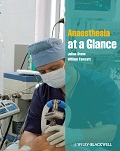A 25-year-old male is admitted, after being involved in a pub fight, with a glass injury to his left eye. The ophthalmic surgeon wants to take him to theatre the same evening to repair the injury.
-
1. What are the main anaesthetic concerns?
Show Answer
Correct answer: The main concerns are:
-
full stomach – if he has been drinking alcohol this will delay gastric emptying so he must be treated as a non-starved patient;
-
other injuries sustained;
- alcohol – the patient might be uncooperative and provide an inaccurate history.
The balance of risks has to be weighed between the risk of aspiration if the operation occurs the same evening and the risk of sight loss if the operation is delayed.
-
2. What muscle relaxant could be used?
Show Answer
Correct answer: The trachea will have to be intubated as the patient must be assumed to have a full stomach. The choice of muscle relaxant is between suxamethonium (a depolarizing NMB) and a non-depolarizing NMB (rocuronium being the one that produces intubating conditions the quickest in this group).
-
3. What are the pros and cons of each?
Show Answer
Correct answer: This is an issue of balancing the risk of worsening the condition of the eye against that of hypoxia and airway soiling. Suxamethonium will cause a transient increase in intraocular pressure with the potential risk of eye content expulsion. This has to be considered against the longer time before intubation if rocuronium is used. So long as appropriate preoxygenation and cricoid pressure are used, a modified rapid sequence induction with rocuronium can be used. Both techniques are acceptable.
-
4. Should a premed be used?
Show Answer
Correct answer: Because the patient is at risk of gastric aspiration, an antacid such as an antihistamine (e.g. ranitidine, an H2 blocker) and a prokinetic (e.g. metoclopramide) would be appropriate.
-
5. What effect does alcohol have on MAC?
Show Answer
Correct answer: Acute alcohol consumption lowers a patient’s MAC requirement. Chronic alcohol use increases MAC.
Senior help must be sought if it is felt that the risk from anaesthesia outweighs the benefit of surgery.

